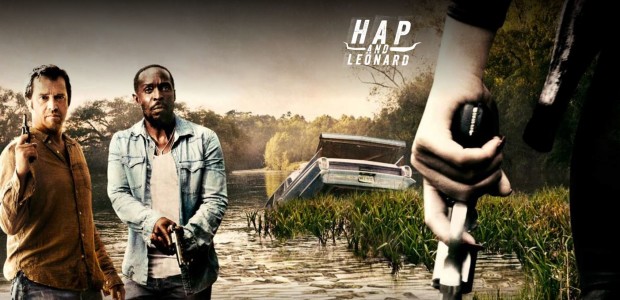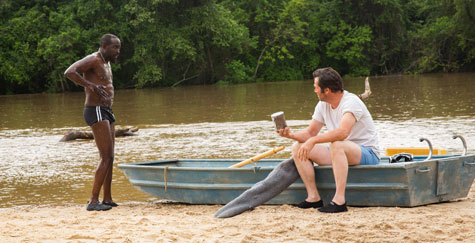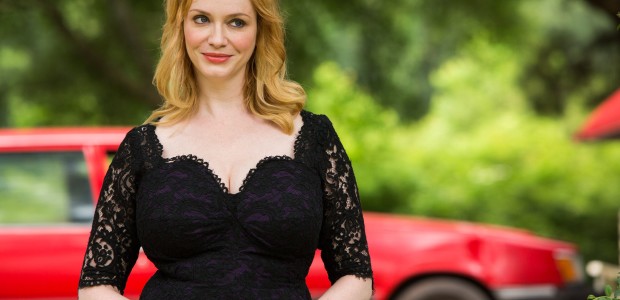
“Goddamn, that man loved putting his head on fire.” — Soldier
If you don’t count the opening flashback, there were only seven characters in War. By the end of the episode, two of them were dead with a third character assumed dead, even though she is never shown actually dying (I suppose if anyone could survive an arrow through the throat, it would be Angel). After the slow burn of the first two and a half episodes, Hap and Leonard certainly is not letting off the steadily rising action and pace that began with the initial double cross in The Dive and continued through the events of Trudy.
But before we get to the harrowing, violent action of the main story in War, I feel like I should address the opening flashback for a couple of different reasons.
I mentioned in my look at The Dive that I was re-reading Savage Season (the source material for this first season). At the time, I said, “the most striking change that Mickle and Damici have made from Lansdale’s text is the apparent alteration to Trudy.” After the flashback sequence presented here (an extension of the flashback from Savage Season), it seems that the series is going to provide a different way for Hap and Leonard to initially meet. Over the course of the series (assuming there are more seasons on the way), this change could actually become more important.
In the novels, it is mentioned that Hap and Leonard met as adults working in the rose fields and became fast friends because of their mutual respect. Despite their differences, Hap saw the courage it took for Leonard to not only enlist for the Vietnam War, but also to be himself—a gay man in rural Texas. Leonard saw honor in Hap’s decision to serve a prison sentence rather than betray his beliefs or flee to Canada to avoid the draft. But the flashback in War seems to point to the two characters meeting as children under the tragic circumstances of the death of their fathers (an idea that is backed up by Leonard’s flashback in The Bottoms of following his father’s body down a hospital hallway). I need to re-read the rest of the novels, but I seem to recall that Hap’s father was killed in an auto accident. I do not remember Leonard’s father also dying in the same way. But as a narrative shortcut, it’s a great touch to link the two men in this way. It helps explain the bond they share and their devotion to each other.
The other thing the opening flashback does is double down on the casual racism of East Texas in the late ’80s. Lansdale’s novels have never shied away from this aspect. Mickle and Damici have honored the text by presenting a world where a seemingly good man like Hap’s father would stop to help a black man who has car trouble after laughing at a blackface routine and referring to the man using a racial slur. Helping the man (assumed to be Leonard’s father) does not excuse the casual racism (especially around his impressionable young son), but it does point out how people are never as completely good or bad as you might want them to be. It is a theme that is constantly played out in this episode even as the violence escalates to almost cartoonish levels.
Now back to the present day (or at least, the late ‘80s) storyline.

Following the murders of Chub and the two policemen at the end of Trudy, Soldier, Angel, and Paco force their captives back to Leonard’s house. They make Leonard dig up the box of money that was buried in the barn, only to find it empty. Not surprisingly, this sends Soldier into just a wee bit of a rage. He immediately starts torturing Howard, causing Trudy to admit that she took the money and hid it from everyone. From there, things go very, very wrong.
In an incredibly tense and horrific scene, Soldier first threatens Trudy with violence and then proceeds to the real thing when she still refuses to give up the location of the money. Christina Hendricks has constantly surprised me as Trudy, giving her so many layers from straight manipulation to gentle heartbreak to steely-as-hell “go fuck yourself” resolve. Her work in the kitchen scene as Soldier tortures her may be her best performance yet. She believably portrays the pain and horror of having a nail driven through her hand without breaking down into hysterics. When Soldier threatens to continue if she does not talk, Trudy has her finest moment by laying her other hand down on the table while glaring him down. Sure, it’s a stupid move on her part—Soldier is almost certainly going to kill them all as soon as he gets his money—but it’s badass in a way that most shows could never get away with.
This is the first episode Jim Mickle has directed since The Bottoms. Where Mickle’s first two episodes sometimes felt alternately rushed or lackadaisical in places, War is an assured piece of storytelling. Working from the script by Nick Damici, Mickle confidently moves from the building tension of the kitchen scene to graphic violence (Paco’s death is so prolonged, gruesome, and over-the-top, it qualifies as an impressive piece of Grand Guignol) with stops in between for some surprising sentiment and character development.
While the escalating suspense and action are the main draw of this episode, almost slipping by unnoticed is how the running commentary by Soldier manages to point out the contradictions in each character. This is most blatantly done when he basically calls Howard a hypocrite for encouraging violence against Hap. “You went all in, didn’t you, Howie? But you call yourself a hippie?” Soldier asks him before blowing his head off. It is at once a shocking moment—obviously from the violence of seeing Howard die so suddenly—and a sad end to a character who was always unlikable, but who honestly believed he was always doing the right thing. Yes, he was trying to save Trudy’s life by coming up with the plan of torturing Hap to get her to talk, but—like the idea of selling cocaine—it was also a betrayal of his core values. Soldier is a psychopath and a racist, but he seems to appreciate it when a person sticks to their guns. Not coincidentally, Hap and Leonard are the two characters who are the most dedicated to their value system, never wavering from their support of each other. That consistency of character is probably the only reason that Soldier has not yet killed them.
Of course, while Soldier may or may not see value in the way Hap and Leonard stick together, he is still a sadistic killer. As seen in the way he gunned down Howard and tortured Trudy, he would not blink if killing everyone in the room means getting to the missing money. But for as much as he swaggers about, acting the part of an ice-cold killer, it is the things both big and small that show how much of a front he puts up. From the thick wad of tape holding his glasses together to his sincere delight at dancing to his electronica mix, Soldier is never far away from being the sort of bullied nerd he most likely grew up as.
And then there is Soldier’s relationship with Angel. For almost the entire season, their pairing has been played as something of a darkly comic gag. Despite being roughly the same height, Angel seemed to tower over Soldier with her mohawk and her statuesque frame clothed in revealing spandex and leather. In Trudy, Soldier made several joking references to the savagery of Angel’s sexuality and in War, he explains at least twice how he plans to use some of the money to marry Angel and take her on a tropical vacation. Until Hap put an apparent end to Angel’s life courtesy of Paco’s crossbow, all of Soldier’s rambling about his love and fear of Angel simply sounded like he was having fun regaling his hostages with elaborate stories that eventually wound back to a point he was trying to make. Their only real connection appeared to be their adherence to violence as a way of getting what they wanted. But as Soldier held the possibly dying Angel, he revealed himself to be a man telling the truth about how much he loved his partner. Like Hap’s father, Howard, Chub, and Trudy, Soldier was shown to have some degree of bruised humanity to him. He is still clearly the villain in this story—love cannot redeem him—but the dose of humanity does clarify his actions a little bit and make him a much more intriguing and dangerous bad guy going forward.
While Soldier, in his own strange way, sticks to his core values, Hap and Leonard stay true to themselves. Hap cannot help but be the noble hero. Free and clear from Soldier and Angel, all he and Leonard have to do upon escaping is continue into the woods where they stand a good chance of remaining hidden. But despite Leonard’s warnings, Hap returns to save Trudy. Leonard, ever the true friend, stops Howard’s plan of torturing Hap and returns to help rescue Trudy (of course, he is handcuffed to Hap, so I guess he didn’t have much of a choice, but I like to think he would have gone back anyway).
That leaves Trudy to be Trudy. But who is Trudy? I have read the novel and at this point, I still don’t know what to expect from the character. Mickle and Damici have changed her enough from the source material to make her an enigmatic presence. Is she telling the truth when she claims she hid the money because she was convinced by Hap and Leonard that buying and selling drugs would be immoral or was she simply greedy? At the end of the episode, as she drives off, leaving behind Hap and a badly-injured Leonard, is she going to get help, return to save the day, or keep driving toward the horizon, leaving the titular duo to take on Soldier by themselves? I have no idea what direction her character will take next, and I find that exciting. Trudy stays true to herself by being unpredictable.
After this dense and action-packed of an episode, I am fascinated to see how Mickle and Damici will wrap up this season with only one episode left. Despite it looking like the season will end more or less where the novel did, I have several questions about how certain plot points will be handled. It is a good sign that I find myself guessing when I should already know the answers.
Hap and Leonard (Season one, episode five: War)
(Airs on Sundance Channel, Wednesday nights at 10:00 pm EST)
— MATT WEDGE.
[Episode Three reviewed here!]
LOOKING FOR UNDERGROUND CULT MOVIES, DVDs, LIMITED VHS & OTHER COOL STUFF?
CHECK OUT THE DAILY GRINDHOUSE/CULT MOVIE MANIA STORE!
Tags: Books, Christina Hendricks, Crime, James Purefoy, Jim Mickle, Joe R. Lansdale, Michael K. Williams, Nick Damici, Pollyanna McIntosh, TV







No Comments